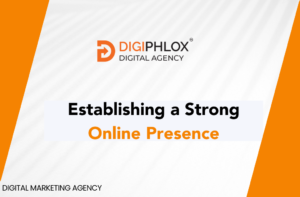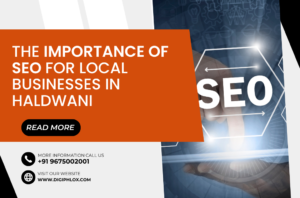In today’s digital age, having a website for your business is crucial for success. A website provides a platform for potential customers to learn about your products or services, interact with your brand, and make purchases. In addition, a well-designed website can help you build credibility, establish a strong online presence, and increase brand awareness. In this article, we’ll explore why a website is important for your business and how it can help you achieve your goals.

Here are some of the benefits of having a website –
- Increased Visibility
- Building Credibility
- Establishing an Online Presence
- Improving Customer Experience
- Attract organic traffic
- Data Collection
1. Increased Visibility
Yes, increased visibility is one of the key benefits of having a website for your business. By having a website, your business can be found online by customers through search engines like Google, Bing, and Yahoo.
In addition, a well-designed website can also help establish your business as a credible and professional entity. This can be especially important for small businesses, as it can help them compete with larger, established companies.
Having a website also allows you to showcase your products and services, provide detailed information about your business, and reach customers 24/7. This can assist with customer acquisition, retention, and eventually business growth. Infographics, blog entries, articles, and videos can all be included in this.
2. Building Credibility
One of the most important benefits of having a website for your business is building credibility. A professional-looking website can help you establish yourself as a credible and trustworthy company in the eyes of potential customers. When people are looking for products or services, they often turn to the internet for information. If your business doesn’t have a website, it may be difficult for people to find you and take you seriously. On the other hand, if your website is well-designed, with a clean and professional appearance, it can help you build trust and credibility with potential customers.
3. Establishing an Online Presence
Having a website is also essential for establishing an online presence. A website allows you to reach a large audience and connect with potential customers from all over the world. This is crucial for small firms because they might not have the funds for traditional marketing and advertising. With a website, you can reach a wider audience, connect with customers on a deeper level, and establish a strong online presence.
4. Increasing Brand Awareness
Another important benefit of having a website for your business is increasing brand awareness. A website is a great way to promote your products or services and reach a large audience. By using search engine optimization (SEO) techniques, you can improve your website’s visibility in search engine results, making it easier for people to find your business online. In addition, you can use social media, email marketing, and other online marketing strategies to drive traffic to your website and increase brand awareness.
5. Improving Customer Experience
Finally, a website can help you improve the customer experience. A well-designed website can provide a user-friendly and intuitive experience for customers, making it easier for them to find the information they need, make purchases, and interact with your brand. In addition, a website can also provide valuable resources, such as blog posts, articles, and customer reviews, which can help educate and inform customers about your products or services.
6. Attract organic traffic
Attracting organic traffic to your website is an important part of improving your online visibility and driving growth for your business.
Here are some strategies to help you attract organic traffic:
- Optimize for Search Engines: Optimize your website’s content and structure to make it easier for search engines to understand and rank your site. This includes using relevant keywords in your content, optimizing your images and videos, and using a clear and organized website structure.
- Publish Quality Content: Publish high-quality, relevant, and engaging content regularly to keep your audience coming back to your site. This can be done through blog entries, articles, films, and infographics.
- Build Backlinks: Backlinks are links from other websites that lead to your site. The more high-quality, relevant backlinks you have, the more likely search engines are to view your site as a credible and authoritative source, which can help improve your search engine rankings.
- Engage with Your Audience: Engage with your audience on social media, forums, and other online communities to build your online presence and drive traffic to your site. This can help you build relationships with your audience, improve brand recognition, and generate referral traffic.
- Utilize Long-Tail Keywords: Long-tail keywords are longer, more specific phrases that are less competitive and easier to rank for in search engines. By targeting these keywords, you can attract more qualified traffic to your site and improve your search engine rankings.
7. Data Collection
Data collection refers to the process of gathering information from various sources for analysis and decision-making. In the context of a website, data collection can help businesses better understand their customers and improve their operations.
Some examples of data that can be collected through a website include:
- Demographic information: This includes information such as age, gender, location, and income level of website visitors.
- Behavioral data: This includes information such as page views, clicks, time on site, and the specific pages visited by each user.
- Customer feedback: This includes comments, reviews, and surveys from customers about their experiences with a business’s products or services.
- Sales data: This includes information about the products or services purchased by customers, the amount spent, and the time of purchase.
By collecting and analyzing this data, businesses can gain insights into the behavior and preferences of their customers. The decisions that are made about product development, marketing, and customer service can then be based on the information provided. In addition, data collection through a website can also help businesses track the effectiveness of their marketing campaigns, identify areas for improvement, and optimize their website for better performance. Overall, data collection is an important aspect of website management that can lead to improved business performance and customer satisfaction.
Conclusion
A website is a crucial tool for any business in today’s digital age. Increased Visibility, building credibility, establishing an online presence, increasing brand awareness, improving the customer experience, and attracting organic traffic and data collection a website can help you achieve your business goals and reach new levels of success.
I hope this article helped you to understand, the 6 Benefits of having a website for your business.
Thank you for reading here, I hope you have liked this article and the article is related to your search. For digital marketing, web designing, SEO, SMM, and more related services contact with DigiPhlox.










2 thoughts on “6 Benefits of Having a Website for Your Business”
Pingback: 6 Benefits of Having a Website for Your Busines...
Pingback: Top 8 Benefits Of SEO For Your Business In 2023 - DigiPhlox
Comments are closed.